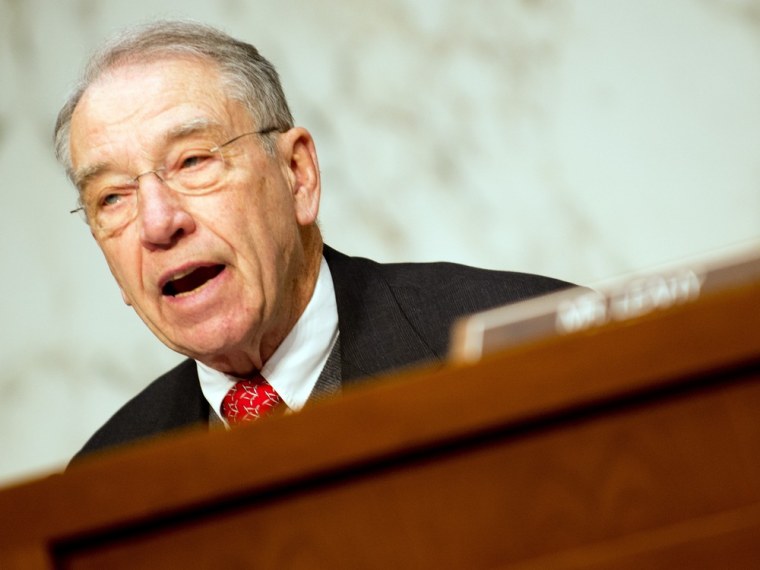In a case that could affect Republicans’ standing with Latino voters, Sen. Charles Grassley, R- Iowa, is pledging to block Senate confirmation of President Barack Obama’s nominee for labor secretary, Thomas Perez.

Grassley accuses Perez – now the assistant attorney general for civil rights – of improperly arranging a swap. If the city of St. Paul, Minn. would withdraw a major fair housing case which was about to be argued before the Supreme Court, then the Justice Department would agree to not go to court in support of a whistleblower suing the city.
Perez testified at his confirmation hearing Thursday before the Senate Health, Education, Labor and Pensions (HELP) Committee that he had acted properly in the St. Paul cases, and that the pivotal decision on the whistleblower was made not by him but by Assistant Attorney General Tony West and career Justice Department attorney Michael Hertz.
Perez said Hertz had decided that whistleblower Frederick Newell, who alleged misuse of federal funds by the city of St. Paul, had a weak case that didn’t merit intervention by the Justice Department on his side.
Grassley, the top Republican on the Senate Judiciary Committee, is taking a special interest in the Perez nomination because he was the chief sponsor of the 1986 version of the whistleblower law – the False Claims Act—which allows people who uncover fraud in government programs to receive a portion of recovered damages and to be protected from retaliation.
Grassley said Wednesday evening before Perez’s confirmation hearing, that he “is supposed to be representing the United States of America and he has all these people in the Justice Department that are professional people and they decide what False Claims cases you take – and he interfered with that.”
Grassley added, “We had the prospects of winning a $200 million False Claims case. We had a whistleblower that goes out on a limb to bring it to the government’s attention. There’s some case before the Supreme Court that he (Perez) doesn’t want them to rule on, so he gets the city to remove it (from the high court docket) – doesn’t that sound like it’s not in the public interest?”
Grassley said he would object to the Senate even taking up the Perez nomination for a vote.
Addressing Republicans’ vulnerability with Latino voters, Congressional Hispanic Caucus Chairman Rep. Rubén Hinojosa, D- Texas, said Tuesday,"For a party that is trying to overcome racially insensitive comments and engage the Hispanic community, I would suggest not smearing a highly qualified Latino cabinet nominee.”
But when asked whether the Perez battle might risk damaging the Republican Party’s appeal to Latinos, Grassley replied, “There are plenty of qualified Latino people that haven’t forgotten their public responsibilities.”
Perez won strong support from HELP Committee chairman Sen. Tom Harkin, D- Iowa, at Thursday’s hearing. “Frankly I’m surprised” that Republican senators are criticizing Perez for intervening in the St. Paul case, Harkin said. “Lawyers make strategic judgments all the time about what cases should be appealed, and given the stakes in this matter, and the importance of strong enforcement of the Fair Housing Act, I think it’s clear the department made the right call.”
Harkin added that he had examined the case with a “fine-tooth comb” and told Perez “the evidence clearly shows that you acted ethically and appropriately at all times.”
Perez told Harkin that it was city officials, not him, who first suggested the idea of linking the decision to withdraw the civil rights case in which the city was a party and the decision by the Justice Department to not side with whistleblower Newell.
Perhaps more important than the whistleblower aspect of the case is the effort by Perez to avoid an potentially unfavorable Supreme Court ruling on the use of a legal theory called “disparate impact” in cases under the Fair Housing Act.
Under disparate impact analysis, a plaintiff need not prove that the defendant intended to discriminate on the basis of race. Instead, disparate impact looks at whether the defendant had a policy that resulted in a statistical disparity in the way members of a racial or ethnic minority were treated.
After discussions with Perez early in 2012, the city of Saint Paul agreed to withdraw a fair housing case which was only three weeks away from its oral argument in the Supreme Court.
The case, Magner v. Gallagher, arose out of attempts by the city of St. Paul to aggressively enforce housing code violations against apartment owners who rented to low-income tenants.
In response, a group of St. Paul landlords made the argument that a disproportionate number of their renters were African-American and that the city’s aggressive enforcement of the housing code would have the effect of increasing costs, raising rents, and shrinking the number of rental units for African-American tenants. Thus the city’s policy would have a “disparate impact” on a racial minority, they contended.
But if the justices had rejected this argument and disallowed the use of disparate impact in fair housing cases, it could have had ripple effects on other civil rights laws.
At Thursday’s hearing, Perez told Sen. Lamar Alexander, R- Tenn., the ranking Republican on the HELP committee, “Bad facts make bad law and I thought that this (Magner v. Gallagher) case was a poor vehicle” for raising the issue of the use of disparate impact in enforcing the Fair Housing Act.
Alexander accused Perez of “an extraordinary amount of wheeling and dealing outside the normal responsibilities of the assistant attorney general for civil rights….It seems to me you’re manipulating the legal process to try to get the result you want from the Supreme Court in a way that that’s inappropriate….”
Recommended stories: